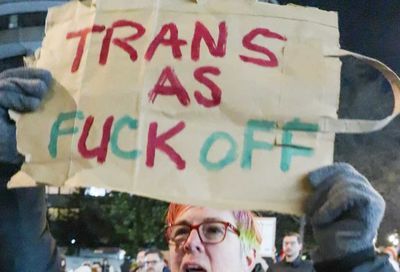Trial Court in Log Cabin Case Finds DADT Unconstitutional
U.S. District Court Judge Virginia A. Phillips ruled this evening that the military’s “Don’t Ask, Don’t Tell” policy is unconstitutional, violating the free speech and due process rights of the members of Log Cabin Republicans, which brought the lawsuit. Referencing an earlier U.S. Supreme Court case that addressed how courts defer to congressional actions regarding the military, Phillips reiterated in striking down DADT that “deference does not mean abdication.”
Phillips found that a permanent injunction of the government’s ban on out gay and lesbian military service is the remedy she will order for the lawsuit that saw a trial this summer and features Alex Nicholson, who serves as executive director of Servicemembers United, as one of the plaintiffs.
More striking, the case — Log Cabin Republicans v. United States — was a facial challenge, meaning that the burden on the plaintiffs was to show that there were no circumstances under which the law would be constitutional. This is a more difficult standard than needed to prove an “as applied” challenge, in which a plaintiff only needs to show that the law is unconstitutional as applied to him or her. Although a higher burden, a successful facial challenge such as the one brought by LCR also brings a more broad outcome — an injunction prohibiting the government from enforcing the law against anyone.
In the LCR case, Phillips has given the plaintiffs until Thursday, September 16, to submit a proposed judgment granting that remedy, at which time the government has seven days to respond with any objections. Thus, the latest date for objections — if LCR’s lawyers take their full time — would be September 23. At any point after that, Phillips could enter her judgment.
At or before then, however, the Justice Department would need to seek and be granted a stay pending any appeal unless it is willing to stop enforcing DADT during any appeal.
As for the court’s opinion, at its most basic point, the court found:
Log Cabin Republicans has demonstrated the Don’t Ask, Don’t Tell Act, on its face, violates the constitutional rights of its members. Plaintiff is entitled to the relief sought in its First Amended Complaint: a judicial declaration to that effect and a permanent injunction barring further enforcement of the Act.
Log Cabin Republicans v. United States, Memorandum Opinion, at 1.
Among the most significant factual findings relating to the Due Process argument was a crushing blow to the “readiness” and “unit cohesion” arguments:
[C]areful review and consideration of the Act itself and its legislative history reveals that this evidence fails to satisfy Defendants’ burden of proving that the Act, with its attendant infringements on the fundamental rights of Plaintiff’s members, significantly furthers the Government’s interest in military readiness or unit cohesion.
Id. at 49.
Specifically, the court found persuasive the evidence presented by LCR regarding the military delaying discharges of deployed servicemembers suspected of violating DADT. Judge Phillips wrote:
This evidence, in particular, directly undermines any contention that the Act furthers the Government’s purpose of military readiness, as it shows Defendants continue to deploy gay and lesbian members of the military into combat, waiting until they have returned before resolving the charges arising out of the suspected homosexual conduct. If the warrior’s suspected violation of the Act created a threat to military readiness, to unit cohesion, or to any of the other important Government objectives, it follows that Defendants would not deploy him or her to combat before resolving the investigation. It defies logic that the purposes of the Act could be served by suspending the investigation during overseas deployments, only to discharge a servicemember upon his or her return to a non-combat station.
Id. at 64 (emphasis added).
Later, the court noted President Obama’s statement that DADT “doesn’t contribute to our national security” in finding:
Defendants have admitted that, far from being necessary to further significantly the Government’s interest in military readiness, the Don’t Ask, Don’t Tell Act actually undermines that interest.
Id. at 65.
The court found then, in a striking passage:
If the presence of a homosexual soldier in the Armed Forces were a threat to military readiness or unit cohesion, it surely follows that in times of war it would be more urgent, not less, to discharge him or her, and to do so with dispatch. The abrupt and marked decline – 50% from 2001 to 2002 and steadily thereafter – in Defendants’ enforcement of the Act following the onset of combat in Afghanistan and Iraq, and Defendants’ practice of delaying investigation and discharge until after combat deployment, demonstrate that the Act is not necessary to further the Government’s interest in military readiness.
Id. at 72.
As to the due process claim, the court concluded:
In order to justify the encroachment on these rights, Defendants faced the burden at trial of showing the Don’t Ask, Don’t Tell Act was necessary to significantly further the Government’s important interests in military readiness and unit cohesion. Defendants failed to meet that burden. Thus, Plaintiff, on behalf of its members, is entitled to judgment in its favor on the first claim in its First Amended Complaint for violation of the substantive due process rights guaranteed under the Fifth Amendment.
Id. at 74.
As to the First Amendment challenge, the court found that DADT’s requirement that a servicemember who “has stated that he or she is a homosexual or bisexual, or words to that effect” be discharged is a content-based speech regulation, which is disfavored under the First Amendment. Phillips wrote:
The Act does not prohibit servicemembers from discussing their sexuality in general, nor does it prohibit all servicemembers from disclosing their sexual orientation. Heterosexual members are free to state their sexual orientation, “or words to that effect,” while gay and lesbian members of the military are not. Thus, on its face, the Act discriminates based on the content of the speech being regulated.
Id. at 79.
The court found that, even when accounting for the greater deference given to speech restrictions in a military setting, “[t]he Don’t Ask, Don’t Tell Act fails this test of constitutional validity.” Id. at 81.
The court concluded:
[T]he Act’s restrictions on speech not only are broader than reasonably necessary to protect the Government’s substantial interests, but also actually serve to impede military readiness and unit cohesion rather than further these goals.
Id. at 83.
The court’s opinion can be found here: DADT opinion Sept 9 2010.pdf
Support Metro Weekly’s Journalism
These are challenging times for news organizations. And yet it’s crucial we stay active and provide vital resources and information to both our local readers and the world. So won’t you please take a moment and consider supporting Metro Weekly with a membership? For as little as $5 a month, you can help ensure Metro Weekly magazine and MetroWeekly.com remain free, viable resources as we provide the best, most diverse, culturally-resonant LGBTQ coverage in both the D.C. region and around the world. Memberships come with exclusive perks and discounts, your own personal digital delivery of each week’s magazine (and an archive), access to our Member's Lounge when it launches this fall, and exclusive members-only items like Metro Weekly Membership Mugs and Tote Bags! Check out all our membership levels here and please join us today!




















